13-4. The Head of the
Serpent Carrier (Ras Al-hague) was seen to culminate
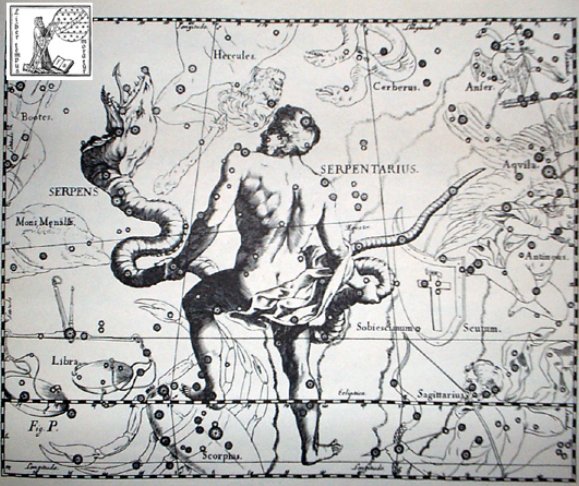
in the night when the Full Moon was at the Nose of the Hydra (Al
Minhar Al Shujā, σ
Hydrae),
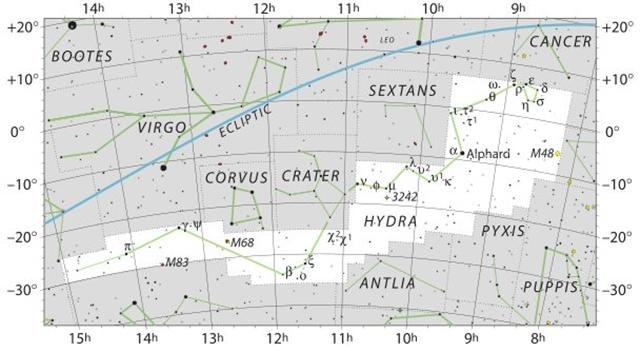
and from there
it would be known for the observers that the Sun had reached 'December 31:
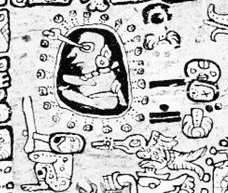
 |
 |
 |
 |
 |
|
Eb4-2 |
Eb4-3 |
Eb4-4 (111) |
Eb4-5 |
Eb4-6 |
|
te vero |
te henua |
toko tokoga |
te henua - e rima |
te kiore - te henua |
|
Vero.
To throw, to hurl (a lance, a spear).
This word was also used with the particle kua
preposed: koía kua vero i te matá, he is
the one who threw the obsidian [weapon].
Verovero, to throw, to hurl repeatedly,
quickly (iterative of vero). Vanaga. 1.
Arrow, dart, harpoon, lance, spear, nail, to
lacerate, to transpierce (veo). P Mgv.:
vero, to dart, to throw a lance, the
tail; verovero, ray, beam, tentacle. Mq.:
veó, dart, lance, harpoon, tail, horn.
Ta.: vero, dart, lance. 2. To turn over
face down. 3. Ta.: verovero, to twinkle
like the stars. Ha.: welowelo, the light
of a firebrand thrown into the air. 4. Mq.:
veo, tenth month of the lunar year. Ha.:
welo, a month (about April). Churchill. Sa.:
velo, to cast a spear or dart, to spear.
To.: velo, to dart. Fu.: velo,
velosi, to lance. Uvea: velo, to
cast; impulse, incitement. Niuē:
velo,
to throw a spear or dart. Ma.: wero,
to stab, to pierce, to spear. Ta.:
vero, to dart
or throw a spear. Mg.: vero,
to pierce, to lance. Mgv.: vero,
to lance, to throw a spear. Mq.: veo,
to lance, to throw a spear. Churchill 2.
... The
strongest and most expert of the warriors is
chosen to receive him on his landing. The
warrior watches the canoe along the beach; and
as soon as the king lands, and has thrown off
his cloak, he darts his spear at him, from a
distance of about thirty paces, and the king
must either catch the spear in his hand, or
suffer from it: there is no jesting in the
business. Having caught it, he carries it under
his arm, with the sharp end downwards, into the
temple or heavoo. On his entrance, the
assembled multitude begin their sham-fights, and
immediately the air is obscured by clouds of
spears, made for the occasion with blunted ends.
Hamamea (the king) has been frequently
advised to abolish this ridiculous ceremony, in
which he risks his life every year; but to no
effect. His answer always is, that he is as able
to catch a spear as any one on the island is to
throw it at him. During the Macahity, all
punishments are remitted throughout the country;
and no person can leave the place in which he
commences these holidays, let the affair be ever
so important ...
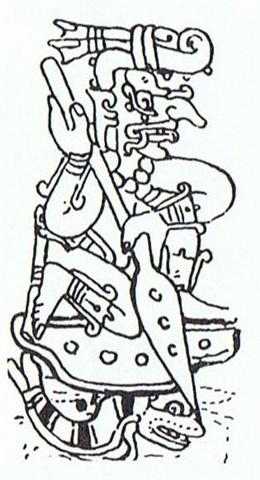
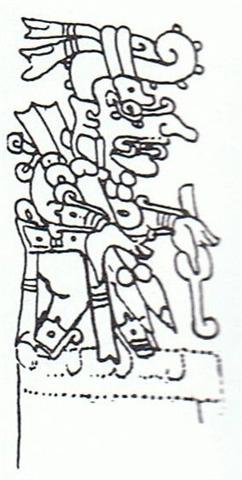 |
|
VISIBLE CLOSE
TO THE FULL MOON: |
|
July 24
(*125) |
25 |
26 |
27 (2 * 104) |
28 |
|
'June 27 |
28 |
29 (*100) |
30 (181) →
SIRIUS |
31 |
|
"June 13
(*84) |
14 |
15 |
16 |
17 (168) |
|
MAY 21 (*61) |
22 |
23 |
24 (12 * 12) |
25 (145) |
|
χ
Cancri (125.2),
BRIGHT FIRE =
λ
Cancri (125.4)
*84.0 = *125.4 - *41.4 |
AVIOR =
ε
Carinae (126.4),
φ
Cancri (126.8)
*85.0 = *126.4 - *41.4 |
Ο Ursae Majoris (127.4)
*86.0 = *127.4 - *41.4 |
Pushya-8
(Nourisher)
υ Cancri (128.1), θ
Cancri (128.2) |
Āshleshā-9 (Embrace)
/
Willow-24 (Stag)
π¹
Ursa Majoris,
δ
HYDRAE (129.6),
AL MINHAR AL SHUJĀ
=
σ
Hydrae, MUSEIDA =
π²
Ursae Majoris
(129.9)
RAS ALHAGUE (α Ophiuchi) |
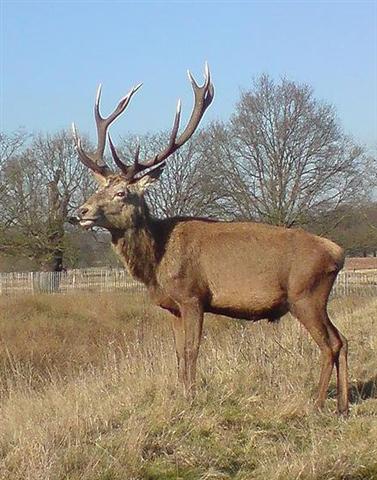 |
|
THE SUN: |
|
'Dec 27 |
28 |
29 (*310 -
*27) |
30 (364) |
31 (*285) |
|
Al Sa’d al Dhabih-20 (Lucky One of the
Slaughterers)
/
Ox / Heard Boy
(Buffalo)
DABIH =
β
Capricorni
(308.0),
κ
Sagittarii (308.1),
SADIR (Hen's Breast) =
γ
Cygni (308.4),
PEACOCK =
α
Pavonis
(308.7)
*267.0 = *308.4 - *41.4 |
KHUFU
OKUL =
π
Capricorni
(309.6),
BOS =
ρ
Capricorni
(309.9)
ARNEB (α
Leporis)
MINTAKA (δ Orionis) |
KHAFRE
ο
Capricorni (310.2),
θ
Cephei (310.5)
HEKA (λ Orionis)
ALNILAM (ε
Orionis) |
MENKAURE
ROTTEN MELON =
ε
Delphini,
φ
Pavonis (311.2),
η
Delphini (311.4),
ζ
Delphini,
ρ
Pavonis (311.7)
PHAKT (α
Columbae)
ALNILAK (ζ Orionis)
*270.0 = *311.4 - *41.4 |
ROTANEV = β Delphini,
ι Delphini (312.3), τ Capricorni (312.6), κ
Delphini (312.7),
SVALOCIN = α Delphini,
υ Capricorni, υ Pavonis (312.8) |
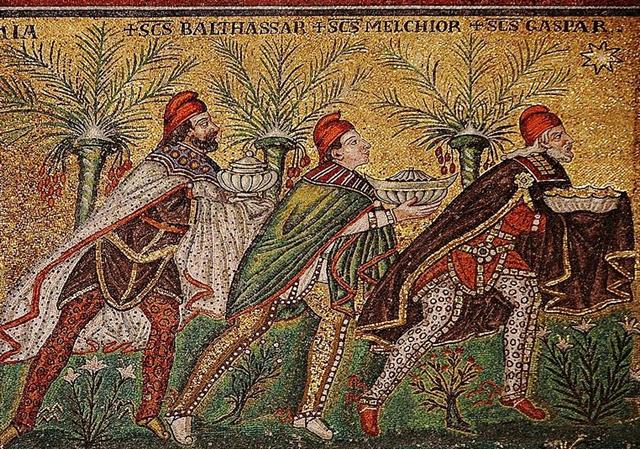 |
In the evening news it is informed that the Chinese
3-year long covid lockdown no longer will prevent people
from visiting their relatives, now as the Chinese
lunar new
year has arrived. This new year will be the year of the
Rabbit.

All through southeast Asia this view is prevalent, however
with the exception of Vietnam where instead the new year
is the year of the Cat.
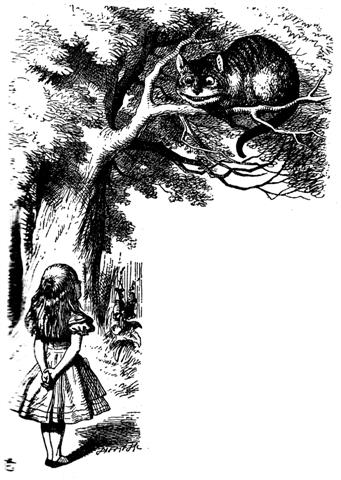
One of the explanations offered
is that the Chinese word for Rabbit (miau) sounds
precisely as the Vietnamese word for Cat.
As I recall, in ancient Egypt, where cats were highly appreciated for
their work of catching rodents, the word was quite
similar:
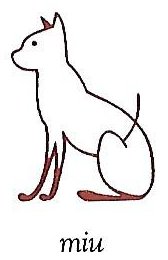
The Chinese word for '4' (shi) sounds as the
Chinese word for 'death', and therefore number 4 was
considered unlucky.
... Interestingly, since another
meaning of shi is 'death', the number 4 is
considered unlucky. (For example, the floor numbering in
hotels sometimes jumps mysteriously from 3 to 5; it's
also considered unlucky to give four of something as a
present.) ...
Glyph line number 4 on the back side of the E tablet
should therefore be associated with death - a place where
nothing will
grow (on the 'Little Bald Woman'). Could it mean
glyph line number 4 is absent and that in reality we
should regard this line as number 5?
Here the Cancer
constellation had arrived and 9 (side a) + 4 (side b) = 13 was also
considered to be an
unlucky number:
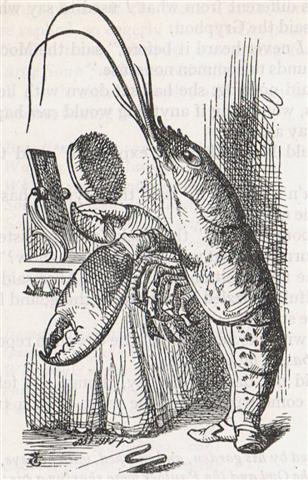
... 'Tis the voice of the Lobster: I heard him declare
'You have baked me too brown, I must sugar my hair' ...
 |
 |
 |
 |
 |
 |
|
Eb4-7 |
Eb4-8 |
Eb4-9 |
Eb4-10 |
Eb4-11 (326 + 118) |
Eb4-12
(445) |
|
te honu |
te henua |
te honu paka |
te maitaki |
te henua |
te henua - te kiore |
|
... Once again henua /
kiore instead of kiore / henua
(cfr Eb4-1).
I suspect that Metoro in both places
realized that he was wrong in reading
backwards and therefore read the glyph
right. The patterns of glyphs in these two
places are not only easily recognized but
should also have been very well known
because of the many
parallel
ocurrences in the texts of different tablets
...
Paka.
1. Dry; to become dry (of things);
pakapaka, to dry out. Te paka is
also the name of the moss-covered areas,
between the small lakes of volcano Rano
Kau, through which one can pass without
getting one's feet wet. 2. To go, to depart;
he-paka-mai, to come; he-oho,
he-paka, they go away. 3. To become calm
(of the sea): ku-paka-á te tai.
Pakahera, skull, shell, cranium;
pakahera puoko tagata, human skull;
pakahera pikea, shell of crab or
crayfish. Gutu pakapaka, scabbed
lips. Hau paka, fibres of the
hauhau tree, which were first soaked in
water, then dried to produce a strong
thread. Moa gao verapaka, chicken
with bald neck. Ariki Paka, certain
collateral descendents of Hotu Matu'a,
who exercised religious functions. Vanaga.
1. Crust, scab, scurf; paka rerere,
cancer; pakapaka, crust, scabby. 2.
Calm, still. 3. Intensive; vera paka,
scorching hot; marego paka, bald;
nunu paka, thin. 4. To arrive, to come.
5. To be eager. 6. To absorb. 7. Shin T.
Pakahera, calabash, shell, jug.
Pakahia, to clot, curdle, coagulate.
Pakapaka, dry, arid, scorching hot,
cooked too much, a desert, to fade away, to
roast, a cake, active; toto pakapaka,
coagulated blood; hakapakapaka, to
dry, to broil, to toast. Pakahera pikea,
shell of crab or crayfish. Churchill.
... The ancient Chinese believed that with
the arrival of the dry season the earth and
sky ceased to communicate. The Spirit of
drought was personified by a little bald
woman with eyes at the top of her head.
While she was present, the sky refrained
from sending rain, so as not to harm
her.Hills and rivers are the first to suffer
from drought. It deprives hills of their
trees, i.e. their hair, and rivers of their
fish, which are their people. The same word,
wang, means mad, deceitful, lame,
hunchbacked, bald and Spirit of drought ...
...
Lobster said to
Flounder: 'Let us-two hide from each other,
see who is best at that.' Flounder agreed to
play this game. Lobster went to a hole in
the coral, hid his body; but his feelers
stuck out, he could not hide them. Flounder
knew where he was, found him. Said Flounder;
'Now it is my turn.' He stirred up a cloud
of mud and scooted into it. Then he returned
to Lobster's side, so quietly that Lobster
did not know he was there. 'Here I am sir,
Lobster!' Lobster was so angry at being
beaten that he stamped on the fish and
smashed him flat. Cried Flounder; 'Now
I've got one eye in the mud!' Therefore
Lobster gouged it out for him and roughly
stuck it back on top. This is the reason why
men tread on the Flounder, but can always
see the Lobster's feelers outside his hole
... |
|
VISIBLE CLOSE
TO THE FULL MOON: |
|
July 29
(420 / 2) |
30 |
31 |
Aug 1 |
2 |
3 (580) |
|
Al Nathrah-6 (Gap)
BEEHIVE (Exhalation of Piled-up Corpses) = ε Cancri,
η Pyxidis (130.4), XESTUS = ο Velorum
(130.5), ζ Pyxidis (130.7),
ASCELLUS BOREALIS = γ Cancri, β Pyxidis (130.9)
*89.0 = *130.4 - *41.4 |
Extended Net-26a
(Ox)
/
Arkū-sha-nangaru-sha-shūtu-12 (Southeast
Star in the Crab)
η
Hydrae (131.0),
ASCELLUS AUSTRALIS =
δ
Cancri
(131.4),
KOO SHE =
Bow and Arrow
=
δ
Velorum
(131.6),
α
Pyxidis (131.8),
ε
Hydrae (131.9)
*90.0 = *131.4 - *41.4 |
ι Cancri (132.0),
ρ
Hydrae (132.4)
*91.0 = *132.4 - *41.4 |
γ Pyxidis (133.6) |
ζ
Hydrae (134.1),
ρ
Cancri (134.2),
ζ
Oct.
(134.3), ο Cancri (134.6), δ Pyxidis (134.9) |
ACUBENS
= α Cancri,
TALITHA BOREALIS = ι Ursae Majoris
(135.0), σ Cancri (135.2), ρ Ursa Majoris
(135.6) |
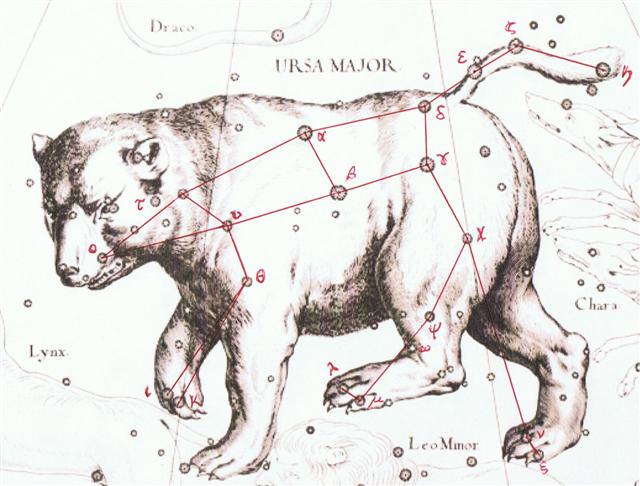 |
|
... He
then set off to look for his wife and
children; he found them again and gave them
food, for his rival had deprived the
children of food in the hope that they would
quickly die of hunger. The
hero [→
Homan,*341 → *206 + *136] then hid
in a meat sack, jumped on the Trickster and
killed him. The corpse was cut up and the
pieces scattered. However, the Trickster
came back to life. He went away and stopped
to rest by a lake, and meditated on death:
should death be final or not? On seeing that
a stick, then a buffalo turd, and lastly a
piece of pith remained afloat after he had
thrown them into the lake, he opted for
resurrection. However, when a pebble sank,
he reversed his decision. It was better that
people should die, he concluded, otherwise
the earth would quickly become
overpopulated. Since that time, people only
live for a certain period and die for ever
...
... At
length there appeared beside them the gable
and thatched roof of the house of Tonganui,
and not only the house, but a huge piece of
the land attached to it. The brothers
wailed, and beat their heads, as they saw
that Maui had fished up land, Te Ika a
Maui, the fish of Maui. And there were
houses on it, and fires burning, and people
going about their daily tasks. Then Maui
hitched his line round one of the paddles
laid under a pair of thwarts, and picked up
his maro, and put it on again. 'Now
while I'm away,' he said, 'show some common
sense and don't be impatient. Don't eat food
until I come back, and whatever you do don't
start cutting up the fish until I have found
a priest and made an offering to the gods,
and completed all the necessary rites. When
I get back it will be all right to cut him
up, and we'll share him out equally then.
What we cannot take with us will keep until
we come back for it.' Maui then returned to
their village. But as soon as his back was
turned his brothers did the very things that
he had told them not to. They began to eat
food, which was a sacrilege because no
portion had yet been offered to the gods.
And they started to scale the fish and cut
bits off it. When they did this, Maui had
not yet reached the sacred place and the
presence of the gods. Had he done so, all
the male and female deities would have been
appeased by the promise of portions of the
fish, and Tangaroa would have been content.
As it was they were angry, and they caused
the fish of Maui to writhe and lash about
like any other fish. That is the reason why
this land, Aotearoa, is now so rough
and mountainous and much of it so unuseful
to man. Had the brothers done as Maui told
them it would have lain smooth and flat, an
example to the world of what good land
should be. But as soon as the sun rose above
the horizon the writhing fish of Maui became
solid underfoot, and could not be smoothed
out again. This act of Maui's, that gave our
people the land on which we live, was
an event next in greatness to the separation
of the Sky and Earth ...
... Sorrowing, then, the two
women placed Osiris's coffer on a boat, and
when the goddess Isis was alone with it at
sea, she opened the chest and, laying her
face on the face of her brother, kissed him
and wept. The myth goes on to tell of the
blessed boat's arrival in the marshes of the
Delta, and of how Set, one night hunting the
boar by the light of the full moon,
discovered the sarcophagus and tore the body
into fourteen pieces, which he scattered
abroad; so that, once again, the goddess had
a difficult task before her. She was
assisted, this time, however, by her little
son Horus, who had the head of a hawk, by
the son of her sister Nephtys, little
Anubis, who had the head of a jackal, and by
Nephtys herself, the sister-bride of their
wicked brother Set. Anubis, the elder of the
two boys, had been conceived one very dark
night, we are told, when Osiris mistook
Nephtys for Isis; so that by some it is
argued that the malice of Set must have been
inspired not by the public virtue and good
name of the noble culture hero, but by this
domestic inadventure. The younger, but true
son, Horus, on the other hand, had been more
fortunately conceived - according to some,
when Isis lay upon her dead brother in the
boat, or, according to others, as she
fluttered about the palace pillar in the
form of a bird. The four bereaved and
searching divinities, the two mothers and
their two sons, were joined by a fifth, the
moon-god Thoth (who appears sometimes in the
form of an ibis-headed scribe, at other
times in the form of a baboon), and together
they found all of Osiris save his genital
member, which had been swallowed by a fish.
They tightly swathed the broken body in
linen bandages, and when they performed over
it the rites that thereafter were to be
continued in Egypt in the ceremonial burial
of kings, Isis fanned the corpse with her
wings and Osiris revived, to become the
ruler of the dead. He now sits majestically
in the underworld, in the Hall of the Two
Truths, assisted by forty-two assessors, one
from each of the principal districts of
Egypt; and there he judges the souls of the
dead. These confess before him, and when
their hearts have been weighed in a balance
against a feather, receive, according to
their lives, the reward of virtue and the
punishment of sin ...
...
According to a variety of sources of the
legend, the Argo was said to have
been planned or constructed with the help of
Athena. According to other legends it
contained in its prow a magical piece of
timber from the sacred forest of Dodona,
which could speak and render prophecies.
Argo Navis is the only one of the 48
constellations listed by the 2nd century
astronomer Ptolemy that is no longer
officially recognised as a constellation. It
was unwieldy due to its enormous size: were
it still considered a single constellation,
it would be the largest of all. In 1752, the
French astronomer Nicolas Louis de
Lacaille subdivided it into Carina
(the keel, or the hull, of the ship),
Puppis (the poop deck), and Vela
(the sails). When Argo Navis was
split, its Bayer designations were also
split. Carina has the α,
β and ε,
Vela has γ
and δ, Puppis
has ζ, and so on.
The constellation Pyxis (the
mariner's compass) occupies an area which in
antiquity was considered part of Argo's
mast (called Malus). However,
Pyxis is not now considered part of
Argo Navis, and its Bayer designations
are separate from those of Carina,
Puppis and Vela ... |


Usually the Honey Bee (bit) was depicted with
his back legs uplifted. Hia!
|
 |
*25 |
 |
|
No star listed
(*110) |
ACUBENS (*135.0) |
|
Eb3-25
(420) |
Eb4-12
(445) |
|
July 9 (190, 555) |
Aug 3
(20
* 29) |
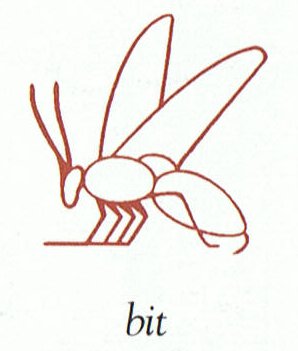
|

















